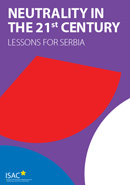The Concept of Neutrality: Origins and Challenges - From the Peace of Westphalia to the European Union
The Concept of Neutrality: Origins and Challenges - From the Peace of Westphalia to the European Union
Author(s): Ove Bring
Subject(s): Politics / Political Sciences, Politics, History, Diplomatic history, Political history, International relations/trade, Peace and Conflict Studies
Published by: ISAC - Centar za međunarodne i bezbednosne poslove
Keywords: neutrality; European Union; Westphalia; international relations
Summary/Abstract: Neutrality could be defined as a nation’s status of impartiality, and thus non-participation in hostilities, when other countries are at war. The position of neutrality is probably as old as war itself, but only in the sense that certain actors wanted to stay outside an armed conflict. The self-proclaimed neutrals had no rights in this context, no guarantees, no legal assurances. But during the Middle Ages and later, for example during the Thirty Years War in Europe, bilateral agreements were concluded that promised certain states respect for their position of neutrality during an ongoing armed conflict. The position of permanent neutrality, valid also in future wars, was more ambitious and was not, at this time, covered in international agreements. But to the extent that a concept of neutrality slowly was emerging, it was linked to the existence of an armed conflict. It was not a matter of neutrality or impartiality in a general political sense. Thus, the emerging legal position of neutrality did not exist in peace time, but only after the outbreak of war. That important point also corresponds to the position of modern international law.
Book: NEUTRALITY IN THE 21st CENTURY –LESSONS FOR SERBIA - ESSAY COMPENDIUM -
- Page Range: 21-27
- Page Count: 7
- Publication Year: 2013
- Language: English
- Content File-PDF

